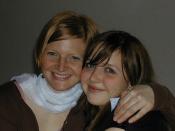I read this book "The Da Vinci Code" by Dan Brown during summer I didn't want to read this book at first, because I had avoided this book for the longest time because frankly the idea of a convoluted thriller around the Holy Grail did not appeal to me (I enjoyed watching "Monty Python and the Holy Grail"; it was very hilarious movie). I considered myself for being non-religious for long time, and I didn't care anything about religious before I read this book.
A murder in the silent after-hour halls of the Louvre museum reveals a sinister plot to uncover a secret that has been protected by a clandestine society since the days of Christ. The victim is a high-ranking agent of this ancient society who, in the moments before his death, manages to leave gruesome clues at the scene that only his granddaughter, noted cryptographer Sophie Neveu, and Robert Langdon, a famed symbolist, can untangle.
The duo becomes both suspects and detectives searching for not only Neveu's grandfather's murderer but also the stunning secret of the ages he was charged to protect. Mere steps ahead of the authorities and the deadly competition, the mystery leads Neveu and Langdon on a breathless flight through France, England, and history itself. The plot gathers speed as Sophie and Langdon escape from the police to begin a hunt for further clues. The story unveils mysteries of the Knights Templar, Opus Dei, the Roman Catholic Church and the Holy Grail. The tale is told of such historical giants as Boticelli, Leonardo da Vinci, Isaac Newton, Victor Hugo and Claude Debussy (to name just a few) who have over the centuries been charged with holding the secrets of Mary Magdalene and Jesus Christ's offspring and the noble lineage of Mary herself.


